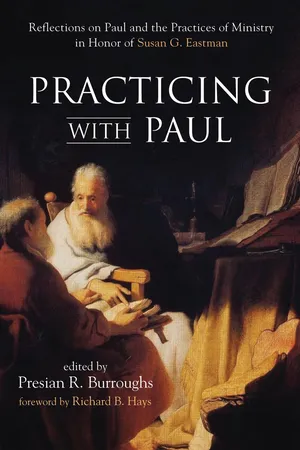
Practicing with Paul
Reflections on Paul and the Practices of Ministry in Honor of Susan G. Eastman
- 264 pages
- English
- ePUB (mobile friendly)
- Available on iOS & Android
Practicing with Paul
Reflections on Paul and the Practices of Ministry in Honor of Susan G. Eastman
About this book
Collecting essays from prominent scholars who span the globe and academic disciplines,Practicing with Paulspeaks into the life of the church in ways that inspire and edify followers and ministers of Jesus Christ. Each contribution delves into the details and historical contexts of Paul's letters, including the interpretation of those texts throughout church history. Meanwhile, each author interprets those details in relation to Christian practice and suggests implications for contemporary Christian ministry that flow out of this rich interpretive process. By modeling forms of interpretation that are practically-oriented, this book provides inspiration for current and future Christian ministers as they too attempt to incarnate the ways of Christ alongwithPaul.
Frequently asked questions
- Essential is ideal for learners and professionals who enjoy exploring a wide range of subjects. Access the Essential Library with 800,000+ trusted titles and best-sellers across business, personal growth, and the humanities. Includes unlimited reading time and Standard Read Aloud voice.
- Complete: Perfect for advanced learners and researchers needing full, unrestricted access. Unlock 1.4M+ books across hundreds of subjects, including academic and specialized titles. The Complete Plan also includes advanced features like Premium Read Aloud and Research Assistant.
Please note we cannot support devices running on iOS 13 and Android 7 or earlier. Learn more about using the app.
Information
Participation and Ministerial Integrity in the Letters of Paul
Table of contents
- Title Page
- Foreword
- Acknowledgments
- Abbreviations
- Introduction
- Chapter 1: Participation and Ministerial Integrity in the Letters of Paul
- Chapter 2: Paul, Reciprocity, and Giving with the Poor
- Chapter 3: The Disruptive Sermon: Preaching and Apocalyptic Imagination
- Chapter 4: Gendered Bodies and the Body of Christ
- Chapter 5: Liberating Paul: African Americans’ Use of Paul in Resistance and Protest
- Chapter 6: Timely Pastoral Response to Suffering: God’s Time and the Power of the Resurrection
- Chapter 7: Prayer in Paul’s Letters: Theology and Practice
- Chapter 8: Painting Hope: Formational Hues of Paul’s Spiritual Warfare Language in 2 Corinthians 10–13
- Chapter 9: Paul the Personalist: Why the Poor Matter to the Church
- Chapter 10: In Christ Together: Intergenerational Ministry and 1 Corinthians 12
- Chapter 11: Christlike Feasting: Attentiveness, Solidarity, and Self-Restraint in Romans
- Chapter 12: The Pursuit of Peace and the Power of God
- Chapter 13: Messianic Anarchy: The Liberating Word of Romans 13:1–7
- Chapter 14: Paul the Peacemaker and the Ministry of Restorative Justice
- Chapter 15: Toward an Evangelical Art of Dying